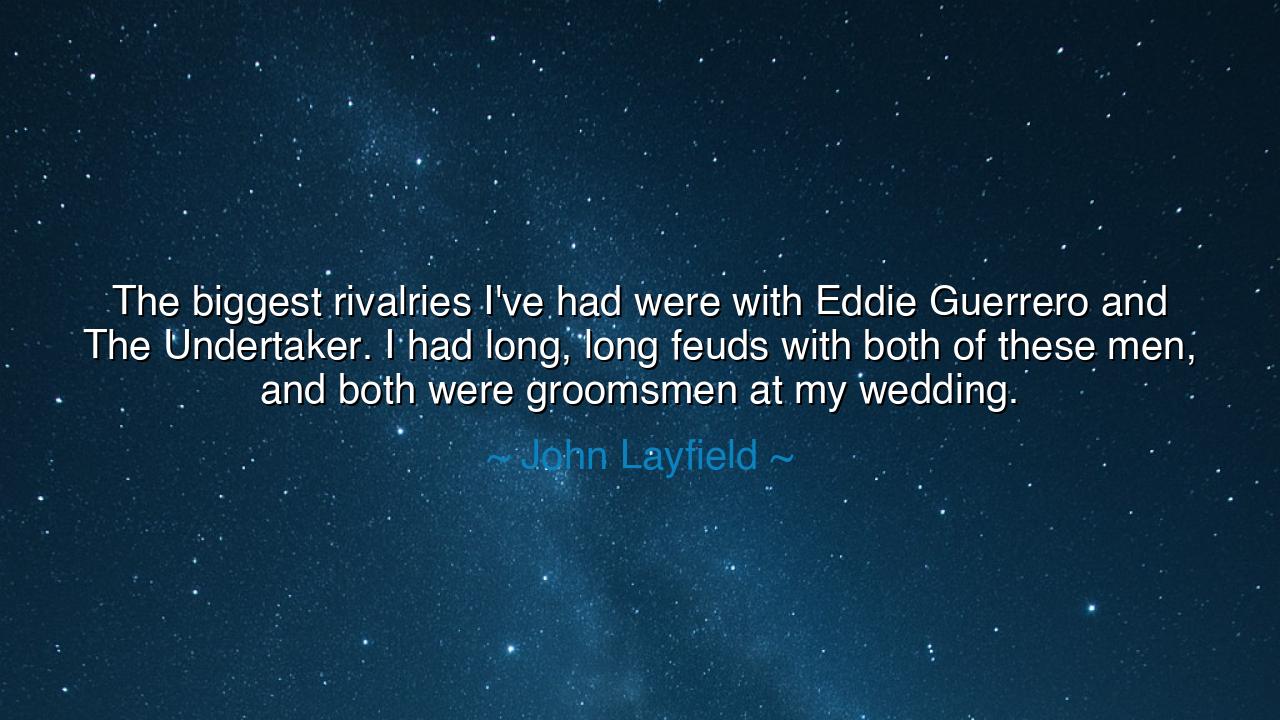
The biggest rivalries I've had were with Eddie Guerrero and The
The biggest rivalries I've had were with Eddie Guerrero and The Undertaker. I had long, long feuds with both of these men, and both were groomsmen at my wedding.






In these words of John Layfield, known to the multitudes as a warrior of the squared circle, we glimpse the ancient paradox of rivalry and brotherhood. He speaks of Eddie Guerrero and The Undertaker, men who once stood against him in the arena, testing his strength and spirit in battles that stretched long across the years. Yet these same foes, once draped in fire and fury, became his groomsmen, standing beside him not as enemies but as companions in life’s sacred covenant. Thus is revealed a truth as old as time: from the fiercest conflict can rise the deepest bonds.
The ancients understood this well. In the tales of Achilles and Hector, though they met as sworn adversaries upon the plains of Troy, there was reverence mingled with enmity. Each clash was not only for blood, but for honor, and when Hector fell, Achilles himself wept, knowing that in the death of his rival he had lost a mirror of his own greatness. So too, Layfield’s quote reminds us that rivals shape each other, forging steel against steel until the soul is sharpened and the heart is tempered by fire.
That both Guerrero and The Undertaker stood as witnesses at his wedding speaks of the transformation of strife into kinship. The battles, though fierce, were never meant to destroy but to elevate, to call forth the hidden reserves of courage, endurance, and will. Just as iron is hammered and broken before becoming the blade, so too are friendships born in the furnace of conflict. Layfield’s life teaches that enmity, when held with respect, becomes the soil from which loyalty grows.
Consider also the tale of Julius Caesar and Brutus. While their rivalry ended in betrayal, history whispers that before daggers and death, there was affection and trust. In this story lies the warning of what happens when rivalry is poisoned by treachery rather than bound by respect. Layfield’s reflection stands as the opposite: when rivalry is honored, it becomes a brotherhood stronger than blood, a bond that endures beyond the arena into the sacred spaces of life.
Thus, let the generations remember: those who fight you hardest may also stand beside you strongest. The hand that once struck in battle may one day be the hand that steadies you in joy or sorrow. The path of the warrior is not to destroy his enemy but to be transformed by him, and in that transformation to find a companion for eternity. This is the hidden wisdom in Layfield’s words: that struggle births kinship, and that in the heart of rivalry, one may discover the purest form of friendship.






TNTien Nha
John Layfield’s experience of having his biggest rivals as groomsmen speaks to the complex nature of professional relationships. Wrestling, like many fields, often blurs the lines between real and scripted conflict. Do you think this type of situation is unique to wrestling, or can you think of examples in other industries where fierce competitors later become friends?
TNTrac Nham
It’s incredible that John Layfield had such long feuds with both Eddie Guerrero and The Undertaker, yet they were groomsmen at his wedding. This really challenges the notion that rivals can’t become close friends. How do you think this dynamic plays out in other areas of life, like business or personal relationships—can rivals truly become friends after a long battle?
KMNguyen Khong Minh
I love how John Layfield’s story shows the depth of respect that can exist between people, even after intense rivalries. It’s a reminder that, while rivalries may be fierce in the ring, they don't define the entirety of a relationship. What does this say about the nature of competition? Can real-life friendships develop in spite of professional conflicts?
KMDuc 11 Khuc Minh
John Layfield’s mention of having Eddie Guerrero and The Undertaker as groomsmen, despite long rivalries, is fascinating. It highlights how, in professional wrestling, rivalries are often part of the show, but there’s still respect and camaraderie beyond the ring. Do you think it’s possible to separate personal relationships from the drama created in professional sports or entertainment?